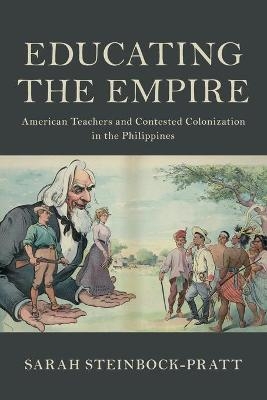
Educating the Empire
American Teachers and Contested Colonization in the Philippines
Seiten
2021
Cambridge University Press (Verlag)
978-1-108-46100-9 (ISBN)
Cambridge University Press (Verlag)
978-1-108-46100-9 (ISBN)
This book examines how education contributed to the creation of US empire in the Philippines. Sarah Steinbock-Pratt demonstrates how, in the classroom, American individuals challenged official narratives of empire, and how daily interactions created imperial realities on the ground that often diverged from the dictates of the colonial state.
This book examines how education contributed to the creation of US empire in the Philippines by focusing on American teachers and the Filipinos with whom they lived and worked. While education was located at the heart of the imperial project, used to justify empire, the implementation of schooling in the islands deviated from the expectations of the colonial state. American teachers at times upheld, adapted, circumvented, or entirely disregarded colonial policy. Despite the language of white masculinity that imbued imperial discourse, the appointment of white women and black men as teachers allowed them to claim roles and identities that transformed understandings of gender and race. Filipinos also used the American educational system to articulate their own understandings of empire. In this context, schools were a microcosm for the colonial state, with contestations over education often standing in for the colonial relationship itself.
This book examines how education contributed to the creation of US empire in the Philippines by focusing on American teachers and the Filipinos with whom they lived and worked. While education was located at the heart of the imperial project, used to justify empire, the implementation of schooling in the islands deviated from the expectations of the colonial state. American teachers at times upheld, adapted, circumvented, or entirely disregarded colonial policy. Despite the language of white masculinity that imbued imperial discourse, the appointment of white women and black men as teachers allowed them to claim roles and identities that transformed understandings of gender and race. Filipinos also used the American educational system to articulate their own understandings of empire. In this context, schools were a microcosm for the colonial state, with contestations over education often standing in for the colonial relationship itself.
Sarah Steinbock-Pratt is Assistant Professor of History at the University of Alabama.
Introduction; 1. Creating a catalog of colonial knowledge; 2. A civil empire: determining fitness for colonial education; 3. Professionals and pioneers: teachers' self-depiction in empire; 4. Recreating race: evolving notions of whiteness and blackness in empire; 5. A political education: Americans, Filipinos, and the meanings of instruction; 6. All politics is local: American teachers and their communities; 7. Speaking for ourselves: dignity and the politics of student protest; Epilogue.
| Erscheinungsdatum | 24.05.2021 |
|---|---|
| Reihe/Serie | Cambridge Studies in US Foreign Relations |
| Zusatzinfo | Worked examples or Exercises |
| Verlagsort | Cambridge |
| Sprache | englisch |
| Maße | 151 x 228 mm |
| Gewicht | 518 g |
| Themenwelt | Geisteswissenschaften ► Geschichte ► Regional- / Ländergeschichte |
| Geschichte ► Teilgebiete der Geschichte ► Wirtschaftsgeschichte | |
| ISBN-10 | 1-108-46100-X / 110846100X |
| ISBN-13 | 978-1-108-46100-9 / 9781108461009 |
| Zustand | Neuware |
| Haben Sie eine Frage zum Produkt? |
Mehr entdecken
aus dem Bereich
aus dem Bereich
eine Globalgeschichte des Kapitalismus
Buch | Hardcover (2023)
C.H.Beck (Verlag)
CHF 53,20


